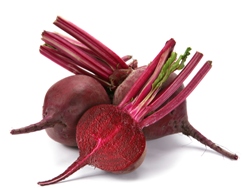Why eating bread can lower your blood pressure
Release Date 22 March 2012

A new study from the University of Reading has found that even small doses of beetroot juice lower blood pressure. In addition, bread enriched with either white or red beetroot had a similar effect.
High blood pressure (BP), or hypertension, increases your risk of having a heart attack or stroke, the leading causes of death in the UK.
Previous studies showed that drinking 500ml of beetroot juice led to a reduction in blood pressure over 24 hours. Reading's research is the first to look at a dose response - measuring the effects of 100g, 250g and 500g of beetroot juice to determine the minimal dose required to lower BP.
A 100g dose resulted in a significant lowering of BP in the short-term (0 to 4 hours) and longer term (0 to 13 hours). And bread enriched with a similar dose of both white and red beetroot also reduced BP by a similar margin.
This effect is attributed to the high nitrate content of the beetroot, a chemical that when ingested becomes nitric oxide which increases blood flow and keeps our blood pressure low. The study also looked at the impact of betalains, the pigment responsible for the deep red colour of beets. Researchers found red and white beetroot, which does not contain betalain, had an equal effect in lowering BP.
Professor Julie Lovegrove, of the Department of Food and Nutritional Sciences at Reading, said: "This new data strengthens the evidence for a beneficial effect of nitrate-rich foods in lowering BP, even at relatively low levels of dosage.
"Processing beetroot during bread production did not significantly impact on the effects of reducing BP, and our studies suggested that nitrate in beetroot contributed to BP reduction, whereas betalains had minimal impact. Further, enriching bread with beetroot may provide a useful vehicle to increase beetroot consumption, particularly for those people at risk of cardiovascular disease."
The study, Beetroot juice, beetroot enriched bread and blood pressure, by Hobbs DA, Kaffa N, George TW, Methven L, Lovegrove JA appears in the British Journal of Nutrition.
Ends
For more information please contact Rona Cheeseman, Research Communications Manager, in the press office on 0118 378 7388 or email r.cheeseman@reading.ac.uk
